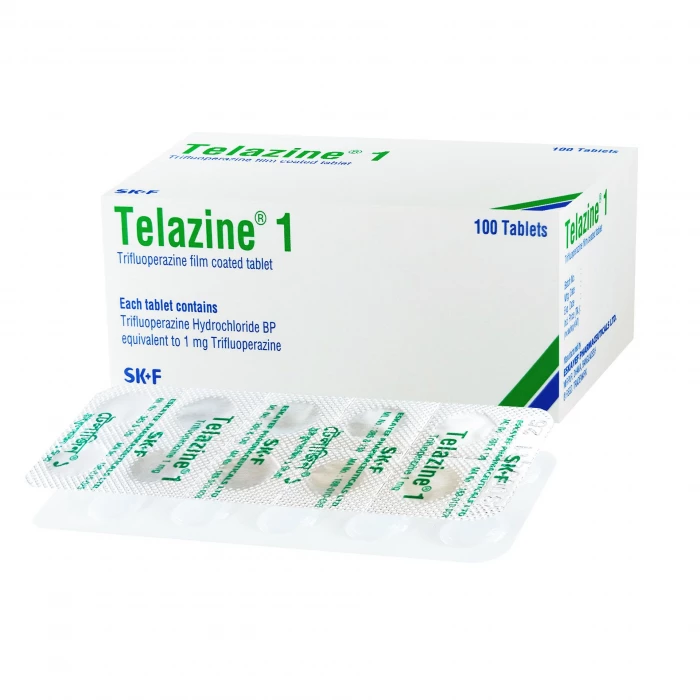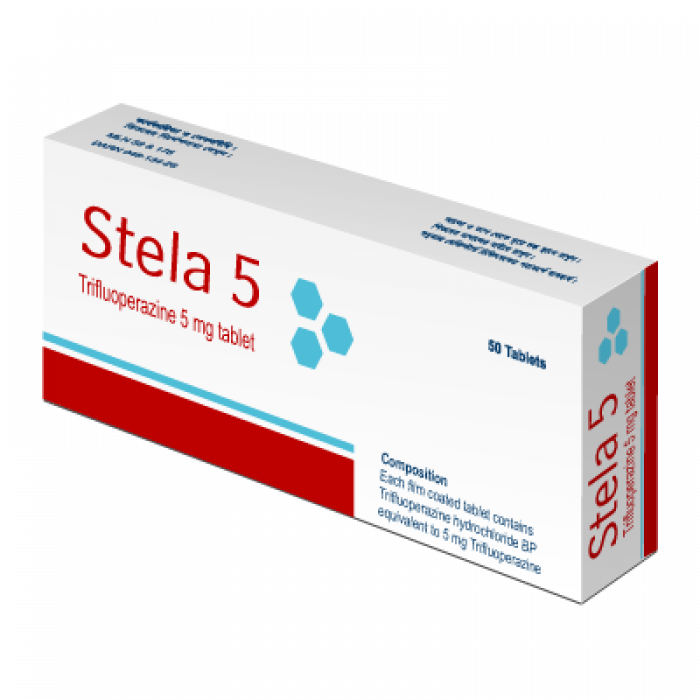
✔ 100% Authentic Product
👁️ Currently Viewing 2776
Sizonil 5mg Tablet 10pcs
Sizonil 5mg Tablet is an antipsychotic medicine that is used to treat symptoms of schizophrenia as well as for the short-term treatment of anxiety. Sizonil 5mg Tablet is not recommended for use in patients less than 6 years of age.
📄Prescription Required
Discount
Price: ৳ 33
MRP:
৳
35
5%
Off

100% Genuine Products, Guaranteed

Safe & Secure Payments, Always

Fast, Secure & Efficient Delivery

Proper Packaging
 Cash on Delivery - All over Bangladesh
Cash on Delivery - All over Bangladesh Regular Delivery - 12-24 Hours, Dhaka City* Charge Tk.39-59
Regular Delivery - 12-24 Hours, Dhaka City* Charge Tk.39-59 Regular Delivery - 24-48 Hours, Other Cities* Charge Tk.99-110
Regular Delivery - 24-48 Hours, Other Cities* Charge Tk.99-110
🌙 রমযান অফার 🌙
 ফ্রি ডেলিভারিঃ - ৭৯৯ টাকা+ অর্ডারে, ঢাকা
শহরে
ফ্রি ডেলিভারিঃ - ৭৯৯ টাকা+ অর্ডারে, ঢাকা
শহরে ফ্রি ডেলিভারিঃ - ২৭৯৯ টাকা+ অর্ডারে, ঢাকার
বাহিরে
ফ্রি ডেলিভারিঃ - ২৭৯৯ টাকা+ অর্ডারে, ঢাকার
বাহিরে
📲 মোবাইল অ্যাপ অর্ডারে সাশ্রয় বেশী
-
Google Play Store থেকে ডাউনলোড
-
Apple Store থেকে ডাউনলোড
100% Genuine Products, Guaranteed
Safe & Secure Payments, Always
Fast, Secure & Efficient Delivery
Proper Packaging
 Cash on Delivery - All over Bangladesh
Cash on Delivery - All over Bangladesh Regular Delivery - 12-24 Hours, Dhaka City* Charge Tk.39-59
Regular Delivery - 12-24 Hours, Dhaka City* Charge Tk.39-59 Regular Delivery - 24-48 Hours, Other Cities* Charge Tk.99-110
Regular Delivery - 24-48 Hours, Other Cities* Charge Tk.99-110 ফ্রি ডেলিভারিঃ - ৭৯৯ টাকা+ অর্ডারে, ঢাকা
শহরে
ফ্রি ডেলিভারিঃ - ৭৯৯ টাকা+ অর্ডারে, ঢাকা
শহরে ফ্রি ডেলিভারিঃ - ২৭৯৯ টাকা+ অর্ডারে, ঢাকার
বাহিরে
ফ্রি ডেলিভারিঃ - ২৭৯৯ টাকা+ অর্ডারে, ঢাকার
বাহিরে- Google Play Store থেকে ডাউনলোড
- Apple Store থেকে ডাউনলোড
🌙 রমযান অফার 🌙
📲 মোবাইল অ্যাপ অর্ডারে সাশ্রয় বেশী
✅ Description:
Trifluoperazine is a phenothiazine used to treat various mental and mood disorders, including schizophrenia and anxiety. It can also help reduce aggression and hallucinations.
Before using this medication, inform your doctor if:
- You are allergic to any of its ingredients.
- You have blood, heart, liver, or bone marrow disorders.
- You are experiencing alcohol withdrawal or are an alcoholic.
- You are taking any other prescription or non-prescription drugs.
- You have asthma, lung infection, Parkinson's or Alzheimer's disease, dementia, or diabetes.
- You have a history of cancer.
- You are pregnant, planning to become pregnant, or breastfeeding.
The dosage should be prescribed by a doctor based on your medical history and condition. For adults, the typical dose for treating schizophrenia is 2-5 mg taken orally twice a day. For treating anxiety, the usual dose is 1-2 mg taken orally twice a day.
Safety Advices

Alcohol
UNSAFE
Sizonil 5mg Tablet may cause excessive drowsiness when taken with alcohol. Avoid consuming alcohol while on this medication.

Pregnancy
UNSAFE
Sizonil 5mg Tablet may be unsafe during pregnancy. Limited human studies exist, but animal studies suggest harmful effects on the developing baby. Your doctor will assess the benefits and potential risks before prescribing it.

Breastfeeding
UNSAFE
Sizonil 5mg Tablet is probably unsafe for use during breastfeeding. Limited human data suggest that the drug may pass into breast milk and harm the baby.

Driving
CAUTION
Sizonil 5mg Tablet may cause side effects like dizziness, drowsiness, or blurred vision, affecting your ability to drive. Avoid driving if you experience these side effects.

Kidney
CONSULT YOUR DOCTOR
There is limited information on the use of Sizonil 5mg Tablet in patients with kidney disease. Consult your doctor for advice specific to your condition.

Liver
CONSULT YOUR DOCTOR
Limited information is available on the use of Sizonil 5mg Tablet in patients with liver disease. However, existing data suggests that it may not be safe for use in patients with liver disease. Please consult your doctor for personalized advice.
✔️ Uses of Sizonil 5mg Tablet
- Schizophrenia
- Anxiety
✔️ How does Sizonil 5mg Tablet work?
It works by inhibiting the release of certain chemical substances in the brain which are responsible for causing anxiety and the symptoms of schizophrenia.
✔️ Side Effects of Sizonil 5mg Tablet
- Headache
- Confusion
- Sleeplessness
- Dry mouth
- Constipation
- Nausea
- Vomiting
✔️ Quick Suggestions:
- Take this medicine with or without food, as advised by your doctor.
- Do not take in larger or smaller amounts than advised/prescribed.
- Consult the doctor if you experience any undesirable side effects.
- Ensure that the treatment course is completed.
- Do not stop the use of this medicine without consulting your doctor.
✔️ Indications:
Trifluoperazine is used in the treatment of anxiety disorder and schizophrenia.
✔️ Pharmacology
Trifluoperazine belongs to the phenothiazine class of compounds and exhibits various pharmacodynamic effects related to its therapeutic actions and side effects. The most significant action of phenothiazines is their antagonism at dopamine receptors in the central nervous system (CNS). This dopamine receptor antagonism in the limbic system and related areas of the cerebral cortex is believed to underlie the antipsychotic effects of phenothiazines. Additionally, their action in the medullary chemoreceptor trigger zone is thought to contribute to their antiemetic properties.
✔️ Dosage & Administration of Sizonil 5mg Tablet
Adults and Children Over 12 Years:
- Starting Dose: 2-5 mg twice daily (b.i.d)
- Increase: Increase by 5 mg daily after one week, then at 3-day intervals based on response.
Children (6-12 Years):
- Starting Dose: 1 mg twice daily (b.i.d)
- Adjustment: Adjust dosage according to the child's weight and symptom severity. Gradually increase the dose until symptoms are controlled or side effects become troublesome.
- Maximum Dose: Usually does not exceed 15 mg daily.
Elderly:
- Starting Dose: Reduce the initial dose by at least half.
Short-Term Management of Severe Anxiety:
Adults and Children Over 12 Years:
- Dose: 1-2 mg twice daily (b.i.d)
- Increase: If necessary, increase to a maximum of 6 mg daily.
Children (3-5 Years):
- Dose: 1 mg daily.
Children (6-12 Years):
- Dose: Up to 4 mg daily in divided doses.
Elderly:
- Starting Dose: Reduce the initial dose by at least half.
Antiemetic:
Adults:
- Dose: 2-4 mg daily in divided doses.
- Maximum Dose: 6 mg daily.
Children (3-5 Years):
- Dose: Up to 1 mg daily.
Children (6-12 Years):
- Dose: Up to 4 mg daily.
✔️ Interaction
Drug Interactions
This medicine may interact with the following drugs:
- Bupropion
- Citalopram
- Clozapine
- Amiodarone
- Bedaquiline
- Ceritinib
Disease Interactions
Liver Disease:
- Use with extreme caution in patients with liver diseases due to the increased risk of worsening the condition.
- Close monitoring of liver function is necessary.
- Dose adjustments or replacement with a suitable alternative may be required based on the patient's clinical condition.
Neuroleptic Malignant Syndrome (NMS):
- Use with extreme caution in patients with a history of NMS.
- Report any unusual symptoms to the doctor immediately.
- Close monitoring and appropriate dose adjustments or replacement with an alternative may be required.
Renal Dysfunction:
- Use with extreme caution in patients with kidney diseases due to the increased risk of worsening the condition.
- Close monitoring of kidney function is necessary.
- Dose adjustments or replacement with a suitable alternative may be required based on the clinical condition.
Seizure Disorders:
- Use with extreme caution in patients with seizure disorders.
- Report any unusual symptoms to the doctor immediately.
- Dose adjustments or replacement with an alternative may be required based on the clinical condition.
Tardive Dyskinesia:
- Use with extreme caution in patients with a history of Tardive Dyskinesia, especially in elderly female patients.
- Report symptoms such as uncontrolled movements of the tongue, mouth, lips, jaw, hands, or feet to your doctor immediately.
- Appropriate corrective measures, dose adjustments, or replacement with a suitable alternative may be required.
✔️ Contraindications
Hypersensitivity
✔️ Pregnancy & Lactation
Pregnancy: Safety for the use of trifluoperazine during pregnancy has not been established. Therefore, it is not recommended that the drug be given to pregnant patients except when, in the judgment of the physician, it is essential. The potential benefits should clearly outweigh the possible hazards. There are reported instances of prolonged jaundice, extrapyramidal signs, hyperreflexia, or hypoflexia in newborn infants whose mothers received phenothiazines.
Lactation: Adequate human data are not available in the case of lactation.
✔️ Precautions & Warnings
- Use with caution in patients with cardiovascular disease due to potential exacerbation of symptoms.
- Caution is advised in patients with epilepsy as trifluoperazine may lower the seizure threshold.
- Patients with angle-closure glaucoma should use trifluoperazine with caution due to the risk of worsening their condition.
- Avoid exposure to extreme temperatures, as this medication may impair the body’s ability to regulate temperature.
- Elderly patients may be more sensitive to the effects of trifluoperazine, particularly its extrapyramidal and hypotensive effects. Start with a lower dose and adjust gradually.
- Use with caution in patients with Parkinson’s disease, as trifluoperazine may exacerbate symptoms.
- Use cautiously in patients with myasthenia gravis due to potential worsening of muscle weakness.
- Patients with BPH should use this medication cautiously because it may cause urinary retention.
- Monitor blood glucose levels closely in diabetic patients, as trifluoperazine may affect blood sugar levels.
- Use with extreme caution in patients with renal or hepatic impairment. Adjust doses as necessary and monitor organ function regularly.
- Discontinue trifluoperazine at least 48 hours before myelography and do not resume for at least 24 hours post-procedure to avoid potential interactions with metrizamide.
- Do not use trifluoperazine to control nausea and vomiting before or after myelography with metrizamide due to potential adverse interactions.
- Trifluoperazine should be used during pregnancy only if the potential benefits outweigh the risks. Discuss with your doctor if you are pregnant or planning to become pregnant.
✔️ Storage Conditions:
- Keep Sizonil 5mg Tablet out of reach of children.
- Store Sizonil 5mg Tablet below 25°C.
⚠️Disclaimer:
At ePharma, we’re committed to providing accurate and accessible health information. However, all content is intended for informational purposes only and should not replace medical advice from a qualified physician. Please consult your healthcare provider for personalized guidance. We aim to support, not substitute, the doctor-patient relationship.









